- Home
- T. Kingfisher
Toad Words
Toad Words Read online
CONTENTS
Copyright Information
Praise for "Nine Goblins"
Title Page
Dedication
Introduction
It Has Come To My Attention
Toad Words
The Wolf and the Woodsman
Bluebeard's Wife
Loathly
The Sea Witch Sets The Record Straight
Never
Bait
Night
Boar & Apples
Odd Season
Acknowledgements
Other Works
This is a work of fiction. Any resemblance to persons, places, large waterfowl, events, or actual historical personages, living, dead, or trapped in a hellish afterlife is purely coincidental.
Copyright 2014 Ursula Vernon
All Rights Reserved
Published in the United States by Red Wombat Tea Company
Smashwords Edition
Artwork by Ursula Vernon
Praise for “Nine Goblins”
“…this story is charming…You like (or feel sorry for) everyone in it, and when you're done you're all rainbowy and happy and thinking 'the world is -sweet- and Imma gonna go out in it and glow!’”
—MCA Hogarth, Even The Wingless
(Actual degree of rainbowy may vary by consumer. Author is not responsible for failure to glow.)
“Hey, I bought it!”
—Sabrina Jeffries, The Truth About Lord Stoneville
(It’s true. She had the receipt and everything.)
“It does not shame your ancestors.”
—Kevin Sonney, voice of Reverend Mord of The Hidden Almanac
Toad Words
And Other Stories
T. Kingfisher
For Ben
INTRODUCTION
For a very long time—rather an embarrassingly long time—I did not believe that I could write short stories.
I held this belief despite the fact that I had written several. Those didn’t count. They were some other thing, a story, yes, and one that was not terribly long, but not a short story.
Because I didn’t write short stories.
It was mostly a belief that I was not capable of doing something so disciplined. I wrote long sprawling rambling epics. I could not possibly be brief enough for a short story. Those short…things…had probably started life as haiku and run to five thousand words. That seemed plausible.
(I wrote blog posts, of course, many of which were stories of things that had happened to me, but that was different. My life was never required to have a plot.)
And then one day I sat down and wrote the first half of a story—I believe it was “The Wolf and the Woodsman”—and because it was fundamentally the story of Little Red Riding Hood, I finished it up a few days later and it was done and over and I did not need to follow the heroine until she died or spend a chapter discussing the issues faced by talking wolves in modern-day society.
Some months later, I wrote another one, about Bluebeard’s wife. And another, and another. They were mostly based on fairy tales, which apparently had some power that allowed me to actually stop writing and not continue into hundreds of pages.
But I still did not think that I was writing short stories.
Because I did not write short stories, it did not occur to me that I might try to sell them. There were magazines in the world that bought short stories, but I had long ago filed them under “nothing to do with me.”
I posted them on my blog instead. My faithful readers have endured many indignities in that space, and they claimed to enjoy these, so occasionally I would write more.
(I also occasionally write poems, after first explaining carefully to the audience and myself that I am not a poet and this is not actually a poem and no poetry was harmed in the making of this blog post.)
People began asking that I collect these stories into a place where they could get at them more easily, rather than digging through LiveJournal looking for them. Some insisted that they would like to give me money for these things, which struck me as both hilarious and somewhat frightening, because if they gave me money for them, surely they would immediately realize that they had just done something very foolish, because these were not short stories and nobody in their right mind would pay that much money for a really really long haiku.
(Incidentally, this is why I have an agent for my day-job writing.)
And then Sigrid Ellis took over as editor of Apex Magazine, a fine publication of literary fantasy, and sent me an e-mail asking to commission a short story.
I stared at the e-mail for quite some time. No one had ever asked me that before. Why would she think I could write short stories?
She mentioned several of the fairy tale retellings I had done and said she wanted something like that.
I was not entirely sure that I could write such a thing on demand. I had about three months until she needed it, so I naturally sat down and hammered out the entire thing that night, while my husband was getting tattooed.
I then sent it off in an agony of terror because I had just done a thing that I didn’t know how to do, namely write a short story, and of course this nice woman was going to come back and say “You obviously tried really hard but I don’t want to buy this and incidentally please don’t ever contact me again or I’ll go to the police.”
(My sense of proportion gets a little skewed sometimes when I’m afraid of disappointing people.)
That short story—“Jackalope Wives”—does not actually appear in this collection, for which I hope you will forgive me. It does not appear because at the time of this writing, Apex Magazine still has the exclusive rights to it, because Sigrid sent the acceptance back about an hour later. (Thanks, Sigrid!)
And that’s actually good, because I am hoping that it will be the title story in the next anthology I do. There will probably have to be another anthology. I’ve sold two more stories in the interim and apparently writing short stories is now a thing that I do, because I show no signs of stopping.
It is a trifle embarrassing.
Most of the stories in this anthology have appeared on my blog at one time or another, and are collected here. (The blog is in my real name, Ursula Vernon, but the book is written as T. Kingfisher—catch me sometime and ask me about brand separation and being a children’s book author.) A few of the poems have been scattered about the web, frequently on the blog of Terri Windling, brilliant editor and author of the book The Wood Wife, which is a comfort read so precious to me that I now dole it out to myself only at times of illness or particularly intense heartbreak.
The one brand-new piece for this collection is the novella “Boar & Apples.” I wanted to put something new in for all those faithful readers who were giving me money for things that they might already have read in one form or another. Without them, there would have been no stories after the first, and I probably would have quit writing and become a medical test subject or a comic gravedigger or something.
Thank you all.
Ursula Vernon,
writing as T. Kingfisher
IT HAS COME TO MY ATTENTION
It has come to my attention
that people like me
are generally not welcome in fairy tales.
It's the talking birds that do it.
The minute a sparrow shows up to pipe a direful warning
it's all over
down at the first hurdle
done
The body in the fifty-fathom well
will have to wait
the old woman turned into a hare
the murdered mother in the juniper tree
as I whip out my Sibley guide and look for the entry
with the fieldmark labeled capable of human speech.
/>
For this crime
I have been accused of a failure of wonder
of having chained up my inner child and sent her
to work in the salt mines.
But the truth
(if you really want to know)
is that I have read too many fairy tales
and lived a bit too long
to be surprised by anything that happens in
the cottages of lonely woodcutters.
I can even venture a guess
to why the bear speaks with the voice of a maiden
(my heart goes out to her)
and why, when the animal has saved your life,
you will be required to make a harp out of its bones.
These are old familiar mysteries
as love is an old familiar mystery
the dwarf's name
the contents of the enchanted walnut
the thing which stands behind the mill.
Fairy tales are human things
which we have chewed over
since before we could eat solid food.
But a bird!
A bird that talks!
This is outside my experience
this un-parrot-like fluency.
I have so many questions—
Where did you learn?
and How do you make the P's and B's and M's with that stiff beak?
and most important,
Are there more like you out there?
TOAD WORDS
Frogs fall out of my mouth when I talk. Toads, too.
It used to be a problem.
There was an incident when I was young and cross and fed up with parental expectations. My sister, who is the Good One, has gold and gems fall from her lips, and since I could not be her, I had to go a different way.
So I got frogs. It happens.
“You’ll grow into it,” the fairy godmother said. “Some curses have cloth-of-gold linings.” She considered this, and her finger drifted to her lower lip, the way it did when she was forgetting things. “Mind you, some curses just grind you down and leave you broken. Some blessings do that too, though. Hmm. What was I saying?”
I spent a lot of time not talking. I got a slate and wrote things down. It was hard at first, but I hated to drop the frogs in the middle of the road. They got hit by cars, or dried out, miles away from their damp little homes.
Toads were easier. Toads are tough. After awhile, I learned to feel when a word was a toad and not a frog. I could roll the word around on my tongue and get the flavor before I spoke it. Toad words were drier. Desiccated is a toad word. So is crisp and crisis and obligation. So are elegant and matchstick.
Frog words were a bit more varied. Murky. Purple. Swinging. Jazz.
I practiced in the field behind the house, speaking words over and over, sending small creatures hopping into the evening. I learned to speak some words as either toads or frogs. It’s all in the delivery.
Love is a frog word, if spoken earnestly, and a toad word if spoken sarcastically. Frogs are not good at sarcasm. Toads are masters of it.
I learned one day that amphibians are going extinct all over the world, that some of them are vanishing. You go to ponds that should be full of frogs and find them silent. There are a hundred things responsible—fungus and pesticides and acid rain.
When I heard this, I cried “What!?” so loudly that an adult African bullfrog fell from my lips and I had to catch it. It weighed as much as a small cat. I took it to the pet store and spun them a lie in writing about my cousin going off to college and leaving the frog behind.
I brooded about frogs for weeks after that, and then eventually, I decided to do something about it.
I cannot fix the things that kill them. It would take an army of fairy godmothers, and mine retired long ago. Now she goes on long cruises and spreads her wings out across the deck chairs.
But I can make more.
I had to get a field guide at first. It was a long process. Say a word and catch it, check the field marks. Most words turn to bronze frogs if I am not paying attention.
Poison arrow frogs make my lips go numb. I can only do a few of those a day. I go through a lot of chapstick.
It is a holding action I am fighting, nothing more. I go to vernal pools and whisper sonnets that turn into wood frogs. I say the words squeak and squill and spring peepers skitter away into the trees. They begin singing almost the moment they emerge.
I read long legal documents to a growing audience of Fowler’s toads, who blink their goggling eyes up at me. (I wish I could do salamanders. I would read Clive Barker novels aloud and seed the streams with efts and hellbenders. I would fly to Mexico and read love poems in another language to restore the axolotl. Alas, it’s frogs and toads and nothing more. We make do.)
The woods behind my house are full of singing. The neighbors either learn to love it or move away.
My sister—the one who speaks gold and diamonds—funds my travels. She speaks less than I do, but for me and my amphibian friends, she will vomit sapphires and rubies. I am grateful.
I am practicing reading modernist revolutionary poetry aloud. My accent is atrocious. Still, a day will come when the Panamanian golden frog will tumble from my lips, and I will catch and hold it, and whatever word I spoke, I’ll say again and again, until I stand at the center of a sea of yellow skins, and make from my curse at last a cloth of gold.
THE WOLF AND THE WOODSMAN
Here. Listen.
I’ll tell you a story.
Listen.
Once upon a time there was a girl. She was probably about twelve or thirteen, but that was an age when children were older than their years and expected to do real work and help with the harvest, so perhaps she was only nine or ten.
Her hood wasn’t red. Red dye is expensive and doesn’t hold well, and nobody who had to dye it themselves would make a red cloak for a child who could be expected to outgrow it by autumn. That was added later because it alliterated. It wasn’t a riding hood, either—the only horse she ever rode was the broad-backed giant that drew her father’s plow.
Still, we make do.
Her name was Turtle. Probably that wasn’t her name, probably she had a perfectly normal name, like other girls, but everyone in the village called her Turtle. There is undoubtedly an amusing story about this, possibly involving a pudgy five-year-old and a suspiciously good-natured snapping turtle, but time is short and dawn comes earlier every year.
Turtle loved to bake. I am sorry to say that she wasn’t very good at it. Her scones were like rocks and her cinnamon rolls weighed more than the crookback iron stove they were cooked in.
Children are odd creatures. If they are thwarted, they tend to do one of two things—they refuse to ever do whatever-it-is again as long as they live, or they grit their teeth and throw hours and days and weeks at it, like a general throwing soldiers at a wall until they can stand atop their piled dead.
Turtle was one of the piled-dead variety, at least with baking. She brutalized flour and butter, she visited wartime atrocities to milk and yeast. She committed acts of crumpet. She developed the sturdy forearms that come from punching dough, but since all the other children had the muscle that comes from milking cows and wrangling goats and digging potatoes, no one noticed.
One day Turtle had savaged an innocent bowl of batter into something that almost (but not quite) resembled muffins. Her mother, who had a great deal to bear on other fronts which do not enter the scope of this story, except to say that Turtle had three older brothers, each more reprehensible than the last, opened the back door and told Turtle to take herself and her regrettable muffins to her grandmother, and if she had to stay the night, so much the better, as there was going to be a great deal of screaming presently, and Turtle was a bit young to be hearing all the words that Turtle’s mother planned to be using.
Turtle, not being a stupid child, swept her muffins into a basket. They went glop, which is not an appropriate sound for muffi
ns to make upon contacting wicker, but Turtle was pleased by this, because the last batch had gone clonk and glop was progress of a sort.
She set out of the backyard and into the woods. Why did her grandmother live a good half-hour’s walk into the deep dark woods, and not in the village? An excellent question. Very likely it had a lot to do with the aforementioned brothers, and the fact that her grandmother loved her mother very much and would chew her own leg off at the hip before she lived in the same house with her. Families are complicated that way.
Turtle set out on the forest path, with her hood thrown back and her basket swinging and the muffins jostling and sloshing inside.
She had gone only a little way—just far enough for the bustle and frolic of a woodland edge to give way to the deeper quiet of a wood—and a wolf stepped out on the path and said “Where are you going, my child?”
He was not standing on his hind legs, as he may be in some illustrations you have seen. Wolves are more dexterous with their paws and mouths than you would believe, but walking on their hind legs hurts their hips. He was not wearing clothes or jewelry or anything else. He was just a wolf, a big, rangy grey-furred beast with a deep chest and narrow hips, and that meant that he was leaner and taller and longer-legged than Turtle, who was used to dogs, would have imagined.
Also he talked.
Turtle was not as surprised by this as you or I would be. In that part of the world at that time, talking animals were not completely unheard of. The problem was figuring out if they were a wicked fairy or a cursed prince—royalty was very bad about being turned into animals, and there were quite a few noble houses who still kept Great-Grandfather’s hide nailed up over the fireplace for a conversation piece—or just an ordinary talking animal. Fairies and princes tended to get you mixed up in unfortunate doings, but there was nothing wrong with a talking animal, who were usually more polite than most people you would meet.

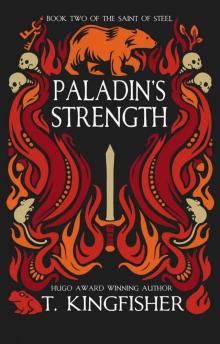 Paladin's Strength
Paladin's Strength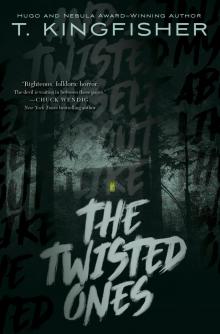 The Twisted Ones
The Twisted Ones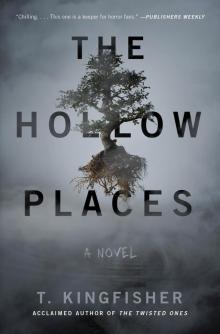 The Hollow Places
The Hollow Places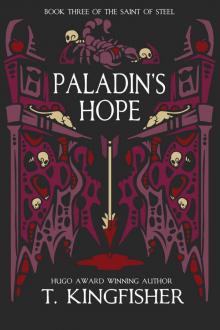 Paladin’s Hope: Book Three of the Saint of Steel
Paladin’s Hope: Book Three of the Saint of Steel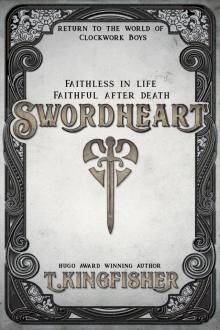 Swordheart
Swordheart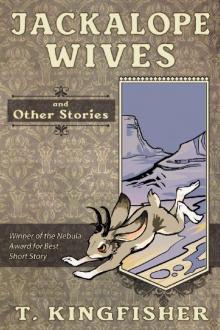 Jackalope Wives And Other Stories
Jackalope Wives And Other Stories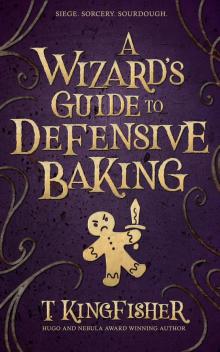 A Wizard's Guide to Defensive Baking
A Wizard's Guide to Defensive Baking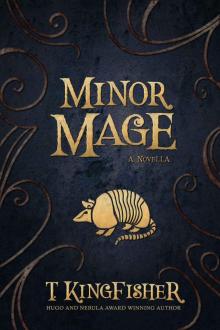 Minor Mage
Minor Mage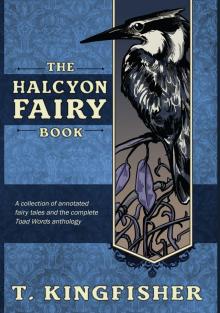 The Halcyon Fairy Book
The Halcyon Fairy Book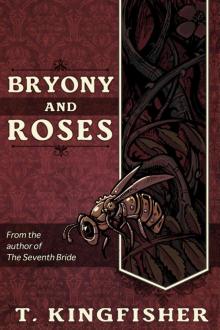 Bryony and Roses
Bryony and Roses The Wonder Engine_Book Two of the Clocktaur War
The Wonder Engine_Book Two of the Clocktaur War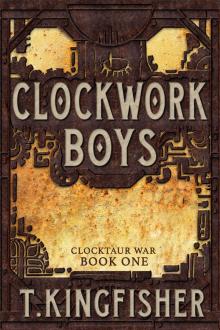 Clockwork Boys: Book One of the Clocktaur War
Clockwork Boys: Book One of the Clocktaur War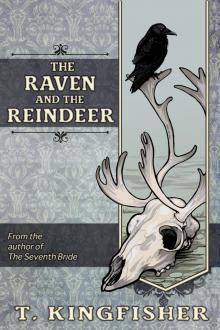 The Raven and the Reindeer
The Raven and the Reindeer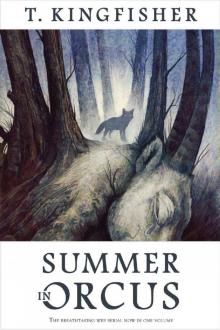 Summer in Orcus
Summer in Orcus The Wonder Engine
The Wonder Engine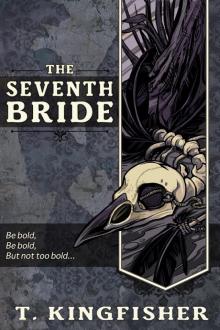 Seventh Bride
Seventh Bride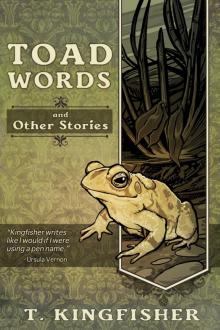 Toad Words
Toad Words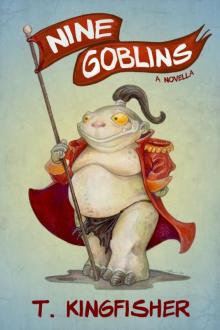 Nine Goblins
Nine Goblins